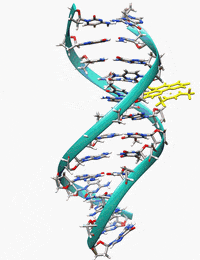
Many drugs are known to metabolize poorly in people with certain genetic variations. Specifically, more than 250 of the most commonly prescribed medications that are used to treat a variety of conditions, are recognized by the FDA as being susceptible to genetic-driven impacts. [3] And, we know that nearly 90% of the population has at least one genetic variation that may affect their response to medications.[1]
When you take a drug or are exposed to an environmental toxin, enzymes in your body get to work to break down that drug so it can be excreted.
YOUR MEDICATIONS
Common Drugs Impacted by Genetics
Thousands of medications are affected by genetics. Over 250 of the most commonly prescribed medications are so susceptible to these genetic-driven impacts that the FDA has issued a warning/guidance on their medication labels.
Fluorouracil (Adrucil®)
Fluorouracil (5-FU) is one of the most successful and widely used chemotherapy drugs. It is often used for the treatment of breast, colon, and skin cancer (three of the most frequently occurring cancers). In general, 5-FU is relatively well tolerated at standard doses. However, an estimated 3-8% of patients have a genetic variation in DPYD that is crucial for the metabolism and deactivation of 5-FU. [Read more]
Clopidogrel (Plavix®)
The FDA requires a black box warning on Plavix labeling to advise physicians of the importance of genetics and the availability of testing. In recent, landmark studies, researchers have found that patients with variations in a gene called cytochrome P-450 2C19 (CYP2C19) have a 3.58 times greater risk for major adverse cardiovascular events such as death, heart attack, and stroke; the risk was greatest in CYP2C19 poor metabolizers. [Read more]
Tamoxifen (Nolvadex®)
Tamoxifen is a medication used for breast cancer or for people at a high risk of developing breast cancer.
Recent research has shown that women with breast cancer may not receive the full medical benefit from taking tamoxifen due to their unique genetic make-up. These women have a version of a gene called Cytochrome P450 2D6, which reduces the effectiveness of tamoxifen and increase their chance of breast cancer recurrence. [Read more]
Atomoxetine (Strattera®)
Although the FDA has approved the drug for treatment of ADD and ADHD, the current FDA-approved Strattera label states “Poor metabolizers of CYP2D6 have a 10–fold higher AUC and a 5–fold higher peak concentration to a given dose of STRATTERA compared with extensive metabolizers. [Read more]
Warfarin (Coumadin®)
According to the FDA, hemorrhage during warfarin therapy is a leading cause of death in Western countries and related adverse events account for 1 in 10 hospital admissions. Genes, specifically VKORC1 and CYP2C9 are primarily responsible for its metabolism. [Read more]
